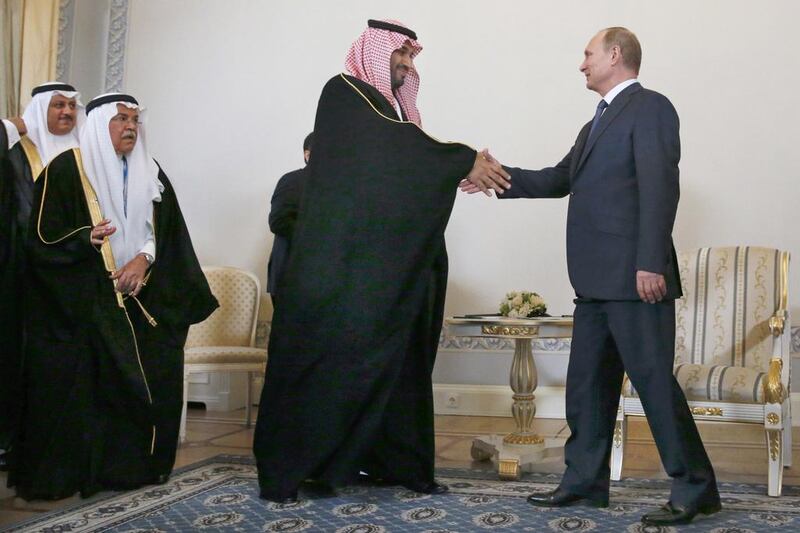A new Middle East and North Africa regional security architecture may be emerging before our eyes. The visit to Russia and France of Saudi Arabia’s deputy Crown Prince Mohammed bin Salman along with several high-level economic, energy and security officials is strategically significant.
Riyadh is the new nexus and it brings Russia and France to the fore in the Mena region. The Salman Doctrine is in play, the assertive Saudi foreign and security policy that is dealing with conflict of varying levels of intensity on three fronts – Yemen, Libya and in the Levant.
King Salman and his son, Prince Mohammed bin Salman who is defence minister, see the kingdom at a crossroads and needing to deal with a host of security and commercial issues.
Riyadh needs Russian help in the Levant with Syria and Iraq. It sees Paris as the key security guarantor in North Africa and in the Mediterranean region. The French deal with Egypt for two dozen Rafale fighter jets is a case in point.
If Saudi Arabia anchors a new security architecture that includes Russia and France, it would speak volumes about the future of the Mena region.
All three countries deal with Iran but to different degrees. Russia is close to Iran and its client states, including Syria. France is tough on Tehran and has taken a strong stand in the run-up to a nuclear deal. For Riyadh, it’s about striking a balance between the two poles. That’s a smart position at this juncture.
Russia and France produce high quality, reasonably-priced arms for Saudi Arabia’s allies and partners. While Moscow is selling helicopters and counter-terrorism equipment to Arab states, Riyadh is intent on buying 23 Airbus H145 helicopters worth $500 million and is also discussing a contract for naval patrol boats built by the French company DCNS.
There are also on-off talks about Russia selling an array of defence equipment to Saudi Arabia.
As Russian equipment is used more frequently in the region in the fight against insurgents and extremists, the more likely it is that this equipment will be sold to the Saudis too.
The Russian-French nuclear nexus in Saudi Arabia is of particular interest.
According to agreements signed in Saint Petersburg, the Russians are to be responsible for nuclear energy reactors and nuclear power stations.
The agreement includes the handling of spent fuel and radioactive waste, the production of radioactive isotopes and their application in industry, medicine and agriculture. It also concerns the training of staff.
As for the French, Saudi Arabia is to receive two Areva EPR pressurised water nuclear reactors. France will also train the Saudis on safety and the treatment of nuclear waste.
Clearly, Saudi Arabia's approach to both Russia and France on nuclear energy is very focused and takes careful note of the kingdom’s future energy requirements.
At the fore of both discussions is the high capital cost for construction and for decommissioning as well as the continuing and future costs of storing nuclear waste.
Both France and Russia have expertise in this field – from starting to decommissioning – and this appeals to the Saudis who are conscious of their obligations in respect of the peaceful pursuit of nuclear energy.
Russia and France appear to be investing in Saudi infrastructure and housing. France’s state-owned investment fund, the Caisse des Depots, is investing $150 million in Kingdom Holding Company, which is chaired by Saudi Prince Alwaleed bin Talal Al Saud. The company is responsible for many housing projects in Saudi Arabia and, in the past, was subcontracted to build airfields and bases by the Saudi ministry of defence.
Moscow and Riyadh have also signed agreements that will utilise Russian expertise in building design, both for military and residential needs. It is significant that Russia and France are involved in this sphere in Saudi Arabia, which has a housing and infrastructure problem in some provinces.
The circle becomes complete when one considers Riyadh's US$10 billion investment in the Russian Direct Investment Fund, which is responsible for infrastructure development in the Russian Federation. That’s quite a bond.
Pundits scoff at the notion of a security linkage between the three countries on the grounds that the US will not allow it as it is the main force in the Gulf region.
In this context, multiple military-to-military agreements are cited, as well as positions adopted by the Obama administration at the Camp David-Gulf Cooperation Council talks last month.
But that is very old-school thinking and it ignores two important developments: decision-making in America has become increasingly dysfunctional and for the Saudis, any perceived or real US monopoly is no longer relevant.
In a sense, Russia and France's judgments and actions for and within the Mena region are based on the choices the US itself has made.
Consequently, robust Saudi engagement now with Russia and France negates the prospect of Mena security architecture problems later.
Dr Theodore Karasik is a Dubai-based analyst on the Gulf with a specific focus on Saudi Arabia





